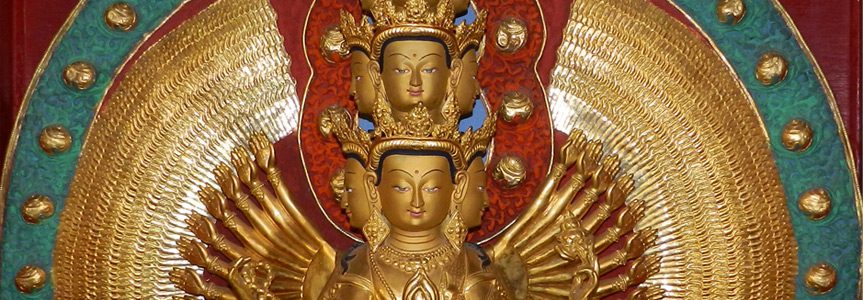The reason we suffer as we do, the reason we encounter the problems that we do, the reason we continue to wander in samsara, cyclic existence, is that we are unaware of our true nature.
This lack of recognition has a dynamic quality that expresses itself in our projection and experience of the phenomenal world, which appears to us as solid, composed of the various elements. We are continually under the impression that there is an “I” poised against everything else that isn’t “I”. Because of this dualistic tendency of the mind, we objectify our experience and make judgements about the objects we perceive; this leads to attachment and aversion, which generate karma and endless suffering. Dualistic clinging, emotional confusion, habit, karma, and the fruits of karma are all natural consequences of this lack of awareness.
Because we don’t know the true nature of our body, speech, or mind, our environment, the past or the future, we take daily events to be true, just as when we are dreaming we take our dreams to be true. When we dream at night, in a sense we’re confused because we believe that we’re actually in a particular place, doing certain things: maybe driving a car, building something or even running from a tiger. In the dream we remember the past and can project a future. Sky, ground, breathing, swallowing — everything seems real. Actually, we’re asleep in our bed and nothing is really happening. Yet while we dream, our reality is dream reality…
In actuality, all existence, whether the suffering of samsara or the blissful experience of nivrana, is as insubstantial as our dreams. All of it is unreal, untrue. It’s an unceasing, luminous, magnificent, illusory display.
Our life from birth to death resembles one long dream. And each dream we have at night is a dream within a dream. Perhaps you have experienced dreaming at night and then waking up and telling somebody “I had an amazing dream”. You make coffee, you’re ready to go to work, and suddenly the alarm goes off and you really wake up. You hadn’t been awake before at all; you’d only dreamed you were awake. This is called a false awakening, a dream of waking and it’s what we do every morning of our lives. In the dream of life we think we are awake, but in fact we’re still dreaming. It’s just that the alarm clock hasn’t sounded yet.
We’re dreamers and we experience the short dreams of night within this long dream of life, within the even longer dream of samsaric becoming. We’ve been taught and assume our daily experience is real and true, so when something difficult happens, we suffer. We’ve also been taught that our dreams are an illusion, so we tend to suffer less from our nightmares than from events in our daily lives. The dream world comes and goes, it’s clearly impermanent, so we think it’s not real. Yet the same is true of our daily reality. It, too, is impermanent. The only difference between them is how long they last.
To know that our reality is not the whole truth of existence frees us from suffering. We’re no longer controlled by our fears or our attachments. Yet the mind easily falls back into its old assumptions with the next movement of this daytime dream. Suddenly a lovely woman or a wonderful man appears, and there we are, believing in the dream we call reality once more. We’ve been fooled again; the illusion hasn’t been completely dispelled — it only trembled for a second. We briefly realized the deeper nature of our experience, but the realization didn’t hold.
We need a method for remembering that we’re only dreaming, for truly breaking through our confusion, not just glimpsing the truth in one moment and forgetting it the next. We need, clearly and decisively, to bring our deluded experience of reality to an end. This requires an authentic recognition of the truth of our experience. Like the true nature of the night dream, it is beyond the extremes of conceptual thought, of “is” and “is not”, and cannot be grasped by the rational mind.
Suppose we discover a big piece of gold and fail to recognize its value. Our lack of recognition doesn’t make it of less worth in the slightest way. Nor does thinking that it has value increase its worth. It simply is what it is. If we know its value, we will use it appropriately. If we don’t, we might use it to hold open a screen door or to prop up a big book. The gold wouldn’t be functioning to its greatest potential.
The foundational nature of the mind is already gold; we simply don’t recognize it as such. The fruit of the spiritual path is the complete realization of the gold; the path is how we accomplish that goal, making obvious what already exists.

